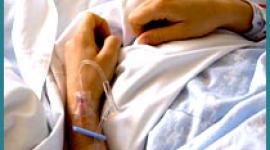Compulsive Overeating with Dr. Steven Crawford
Transcript from Online Conference with: Dr. Steven Crawford on Compulsive Overeating
Bob M: Good evening everyone. Our topic tonight is "Compulsive Overeating". Our guest is Dr. Steve Crawford, Associate Director of the Center for Eating Disorders at St. Joseph's Medical Center. Good evening Dr. Crawford and welcome to the Concerned Counseling website. I'd like to start off by having you tell us a bit more about your expertise.
Dr. Crawford: Good evening, Bob. I have worked with patients with eating disorders for ten years. I currently manage the inpatient and day treatment programs at the Center for Eating Disorders and assist patients with initial consultations to design an individualized treatment plan.
Bob M: Can you explain the difference between compulsive overeating and obesity?
Dr. Crawford: Obesity is a medical term. It simply means being more than 20% above the upper limit for age and height. Compulsive overeating is a behavior. It refers to a pattern of eating that is frequent and usually in response to uncomfortable emotions. It is similar to other eating disorders such as anorexia nervosa, bulimia nervosa and binge eating disorder.
Bob M: How does one figure out if their eating patterns have become a problem...in terms of binge eating?
Dr. Crawford: People that binge eat are usually aware that their eating pattern is a problem. They experience extreme feelings of embarrassment, guilt and depression with their eating. Binge eating disorder is when someone is binge eating at least two days per week for 6 months. It is different from bulimia in that patients do not attempt to counteract the effects of the binge eating...that is they do not induce vomiting, use laxatives, compulsively exercise etc.
Bob M: How does one change the behaviors then that are associated with compulsive overeating?
Dr. Crawford: It is helpful for individuals to begin to identify their particular "triggers', that is events in their life that usually result in them binge eating. Once identified people can begin to work on new ways to deal with these triggers or stress.
Bob M: When you say "triggers", what kinds of things can initiate binge eating?
Dr. Crawford: Trigger generally refer to events that the person experiences as stressful. These can be both positive and negative. Examples are: doing poorly on a test, having problems at work, or getting a promotion. Day to day events such as rush hour can also be a trigger. In working with patients, we try to help them begin to differentiate between physical, real, hunger and emotional hunger.
Bob M: What then are the most effective treatments for binge eating?
Dr. Crawford: Treatment for binge eating disorder consists of several components: We provide patients with nutritional counseling to begin to understand their eating pattern and work towards healthy eating patterns. Therapy is also an important component, both with group and individual therapy. Groups help patients to not feel so isolated and begin to work on self-acceptance. Individual therapy allows patients to explore the use of food for psychological stress. Also, we evaluate if any of the antidepressants would be beneficial in decreasing the impulses to binge eat.
Bob M: Is the treatment done on an inpatient or outpatient basis, for the most part?
Dr. Crawford: Generally treatment for this population is done on an outpatient basis. Patients may get admitted to the inpatient or day treatment unit if they have a severe depression or they have medical problems that are in need of immediate attention.
Bob M: Besides the anti-depressants, are there any other medications that are being used or are on the horizon to control binge eating?
Dr. Crawford: There are currently a host of new diet pills that are now being marketed or are on the horizon. The newest agent is Meridia. This medication, however, is not one that I consider to be known to be effective over the long term and its safety is questionable. 4 out of 5 of the FDA advisory board members actually voted against having Meridia approved. It was allowed on the market because of the demand for these drugs. Meridia is known to cause elevation of blood pressure.
Bob M: Here are some audience questions, Dr. Crawford:
frcnb: How can diet pills be helpful to those who eat when not hungry?
Dr. Crawford: I do not think diet pills are helpful. They are temporary solutions that do not work long term. It is more helpful for individuals to learn coping mechanisms that will allow them to not eat when they are not hungry.
withattitud2: How common is it that one binges, then follows with starvation patterns?
Dr. Crawford: This is not uncommon. People frequently feel uncomfortable after binge eating. They can feel extremely guilty and attempt fasting. This actually is considered to be more of a bulimic pattern than just binge eating.
Bob M: For those just joining us, our guest is Dr. Steve Crawford, of the Center for Eating Disorders at St. Joseph's Medical Center. We are talking about compulsive overeating and taking questions from the audience.
|
|
Diana: Can you give examples of coping mechanisms?
Dr. Crawford: Coping mechanisms are ways to try to reduce stress and to feel more comfortable. They are very individualized. We try to help patients identify ways that they can take care of themselves. Stress management with breathing exercises can be helpful. Learning to go for a walk or call a friend can be useful alternatives to binge eating.
Bob M: For many who binge eat, Dr. Crawford, they tell me it satisfies an emotional need, but then they feel bad about doing it. What specifically can be done to break that cycle? And secondly, is the treatment currently available for binge eaters a long-lasting one or are there relapses?
Dr. Crawford: Breaking the cycle does not occur overnight. One does not make an immediate change to longstanding patterns of behavior. The breaking of the cycle is more of a gradual process with the individual learning over time how to replace the binge eating with other behaviors. Do not expect immediate results or you will be greatly disappointed. Developing control over binge eating is a long term process. Results can be long term as well as the person begins to make life changes. Usually the person does need to be constantly on guard of falling back into old familiar and yet destructive patterns of behavior.
Nicoliz: What's the best way to cope with extremely strong cravings which usually lead me into a binge?
Dr. Crawford: When cravings are overwhelming the person usually does not have time to think clearly. We try to have individuals make a list of alternative behaviors so that in the moment of a craving they can refer to the list to identify alternatives to binge eating. At times medications are necessary to decrease the intensity of the binge impulse. These medications are the antidepressants such as Prozac, Paxil, etc.
froggle08: When I binge eat, going for a walk or calling a friend doesn't help. I could be with my friends or out walking, and all I want to do is go home and eat. What else could I do?
Dr. Crawford: Generally the longer one is able to stall acting on the impulse, the more likely they will be able to not binge eat. Frequently patients tell me that after a certain period of time, the impulse begins to subside. That is why I recommend attempting to distract oneself when they first get the impulse. If you end up acting on the impulse and binge-eating, the important thing is to remember that it does not have to continue. We also try to help people work on stopping the binge process after it has started. Learning to recognize when one is binge eating and then stopping it midstream is an important step in recovery.
Gemma: So, for someone who doesn't have good support around them - what could be their first step to recovery?
Dr. Crawford: Recognizing the problem and then seeking support. Support groups can be extremely helpful. Also seeking professional binge eating treatment if the problem feels out of control.
JoO: I am EXTREMELY overweight -- I lived with emotional abuse as a child and shame wouldn't allow psychological help. I didn't even know it existed. I've gone through different support groups -- each helped heal a little of the pain and the things I didn't understand. I have now spent years trying to help myself through this route. I believe I had to 'go through the pain' in order to heal. But isn't there an easier way? Would help dealing with the emotions have made me heal a lot faster? And even though I think I have dealt with the emotional pain, I'm still overweight. What can I do now?
Dr. Crawford: We believe that there are two important components to treatment, changing the behavior is one and understanding what is driving the behavior is the second. Both components are equally important. If you have been at an above normal body weight for an extended period of time, your set point may be high. Working towards size and self-acceptance are important at this time for you. Dieting is the worse answer. It will set you up to feel disappointed repeatedly.
JoO: This is fine and I agree with you. I have had to learn to see some self-worth in myself. However, I can't stay like this forever. So what would be the next step? My health and sanity demand that this cycle be stopped.
Dr. Crawford: The next step is working towards not binge eating. This is done by not attempting to diet, but to normalize the eating pattern with three meals and a snack per day. Many binge eaters do not have a normal sized breakfast. This results in increased hunger and causes the person to be more likely to binge later in the day.
Bob M: So, is it possible then for a binge eater to do self-help or does it require working with a therapist to be really effective and long-lasting?
Dr. Crawford: Self-help is possible. If the problem has been longstanding and a way of life, frequently nutritional counseling and therapy are necessary for you to begin to understand the binge eating and its psychological component and make life changes.
Bob M: Besides compulsive overeating, there are people who do what's called "grazing". Can you distinguish between the two, please?
Dr. Crawford: Binge eating is defined as eating large quantities of food in a relatively short period of time, usually 2 hours or less. During this time the individual feels a sense of loss of control over their eating. Grazing is a pattern of behavior of eating throughout the entire day. It is less frenzied and more a constant picking at available food. People that graze frequently, keep food in the car, at a drawer at work, or in their bedroom.
Bob M: And is their thought pattern different...in that they don't believe it's as bad as overeating?
Dr. Crawford: People that graze frequently do not count what they have eaten between meals. When describing their eating over a day, they will review their meals and leave out the food in between. This is usually because they tend to not be aware of what or how much they have eaten between meals. This is very different from the person who binge eats and is very aware of feeling out of control.
|
|
Lynk: I don't starve myself. I just keep eating and eating. Is this usual?
Dr. Crawford: Binge eating disorder is defined as not counteracting the effects of eating large quantities of food. Most people that binge eat, do not starve, but repeat the pattern of binge eating over and over.
Gemma: Is there a difference between people that overeat and those that stop eating? Are the emotions behind the behavior generally the same?
Dr. Crawford: I believe that there are great similarities in the two problems with people using food in very different ways to cope.
Bob M: If one were to be serious about recovery, and really dedicate themselves to it, how long would it take before you start to see results?
Dr. Crawford: Again results come gradually with progress met at times with setbacks. We try to assist people in first not looking at the scale to judge if they are making progress. We try to define progress as movement towards a healthy lifestyle with normalized eating patterns and increased activity. Movement can begin as early as the first session.
Bob M: Is there such a thing as people who compulsively eat and then vomit?
Dr. Crawford: While this is not a defined category, there are many individuals that do engage in this process... that is, they do not binge but will induce vomiting after eating normal sized meals. These fit into an unspecified category, but still have an eating disorder that deserves attention and treatment.
Bob M: Previously, we had a guest on, and I know there's a new book out on this, who spoke about the theory that you can just eat everything in site, until finally you are repulsed by food and quit eating and settle into a comfortable and more healthy eating pattern. Is this realistic? And is it healthy? And is it effective?
Dr. Crawford: Frequently, people are accustomed to a diet mentality and are used to depriving themselves of food that they want. The concept behind this theory is that by allowing oneself to eat what they want, when they want it, it will decrease the desirability of that food and decrease the likelihood of bingeing. It works on the premise that as humans we want what we cannot have or at least what we are told we should not have. This gives it greater importance. By permitting oneself to eat, it becomes a part of everyday life. This is slightly different than the idea you suggest with eating until you are actually repulsed by food. This would not be healthy in that it is important to learn to incorporate food into your life in a healthy way.
Bob M: Here's an audience comment on that:
frcnb: I'm afraid I couldn't stop once I started.
Dr. Crawford: In summary, eating until you are actually repulsed by food is probably not helpful but allowing oneself to eat what one wants when wanted is helpful.
Bob M: It's getting late. I appreciate you coming tonight Dr. Crawford. And thanks to everyone in the audience.
Dr. Crawford: Good night and thanks, Bob, for providing me with this opportunity.
Bob M: Good Night.
|
|
APA Reference
Gluck, S.
(2007, February 27). Compulsive Overeating with Dr. Steven Crawford, HealthyPlace. Retrieved
on 2026, March 4 from https://www.healthyplace.com/eating-disorders/transcripts/dr-steven-crawford-on-compulsive-overeating




